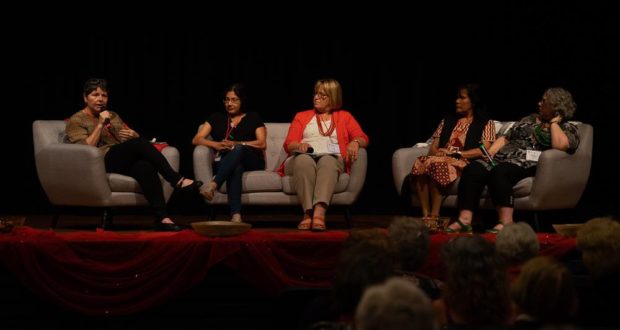The UnitingWomen 2018 panel “Beyond Wonder Women: What now for the next generation of women leaders in the church?” explored leadership from a range of perspectives. Here’s some of the responses from five women in leadership positions in the Uniting Church.
Rev Sharon Hollis (Assembly President-elect and current Moderator of the Synod of Victoria and Tasmania)
Within the Uniting Church we need to be serious about encouraging each other as women; it’s a great gift that we’ve got women in leadership, and mentoring is an opportunity to encourage young women in particular to develop themselves, to keep learning and growing.
We really need the capacity to engage in serious theological reflection—I don’t mean that you need a degree, we all need to be taking seriously how we live our lives in conversation with the faith we have.
The church in Australia has to come to terms with the fact that it’s not the centre of the universe anymore; I say that’s fantastic, because we can be true to our call which is to be salt and light and mustard seed and yeast, all of those fabulous images of God taking the small things and doing something with them.
If we don’t acknowledge our context, we’ll get burnt out again. If we keep thinking that we are going to have the same influence as we did in the 40s and 50s and 60s, we are not going to speak to where people are at.
Rev Sue Ellis (Moderator of the South Australia Presbytery and Synod)
The Bible can be used as a weapon or a tool; it’s used as a weapon when it is used to keep women in their place and we’ve heard some of that from the Pacific Island stories. It’s used as a tool when it helps us to become a disciple of Jesus and take our place with Mary Magdalene and other disciples of Jesus.
So we need to know our Biblical narrative! We need to know what the scriptures used against women are about and their context, and we need to stand up for those scriptures that put women in their rightful place—in equality with men. We are a church that is founded on equality of men and women and the biblical witness tells us that.
Think about yourself—how do you read the Bible? Do you read it for your direction as a woman, do you read it as a moral code? If you read it for those things, all you will find is a list of rules for how to behave.
If you read the scriptures more about how it is a biblical witness of how God is at work in the world, it will support you in your discipleship.
Rev Heather den Houting (General Secretary of the Queensland Synod)
When I studied theology I had a number of “aha!” moments. The first one was that the Bible was not written in English, and that means that the scholarly interpreters are exactly that, interpreters—and we know enough about interpretation to know that no matter how brilliant you think you are, your interpretation is guided by your context.
The myth that somehow there is an objective truth in terms of Biblical scholarship has been exploded. A second thing was that those little headings in our Bible are not the biblical text … for example, the heading “woman caught in adultery” is an editorial comment.
Imagine the story from a different lens, and when you do that you begin to reveal the Anglo-male perspective that comes with those headings.
Dr Sureka Goringe (UnitingWorld National Director)
The power to do new and innovative things, the power to change, does not always sit with the people with the job title. There is profoundly more power at the grassroots, and I encourage you to build alliances, to seek wisdom across the structures of the church across the different councils, and throughout the community.
Gathering people around you with a vision, seeing if there is a community of discernment can be very powerful.
The institution can sometimes be stuck in status quo and needs people who can work across it and outside it to really follow God’s call.
If you can’t spot the leader when something needs to be done, it might be that God is calling you into that space.
Rev Thresi Mauboy (Moderator of the Northern Synod)
When we talk about leaders, we forget about Mother Teresa. When people challenged her, this woman who helped lots of poor people, saying that there were still poor people everywhere, Mother Teresa’s answer was: “I’m not called to be successful, I’m called to be faithful”.
As the church today, we have to be faithful. Wrong is wrong, right is right … as a church, we must tell the truth.
Each of us has our own gifts so I encourage you to humble yourself because if God gives you power, it is important to be in control of yourself, and to be yourself. That is authentic leadership.
 JourneyOnline
JourneyOnline







